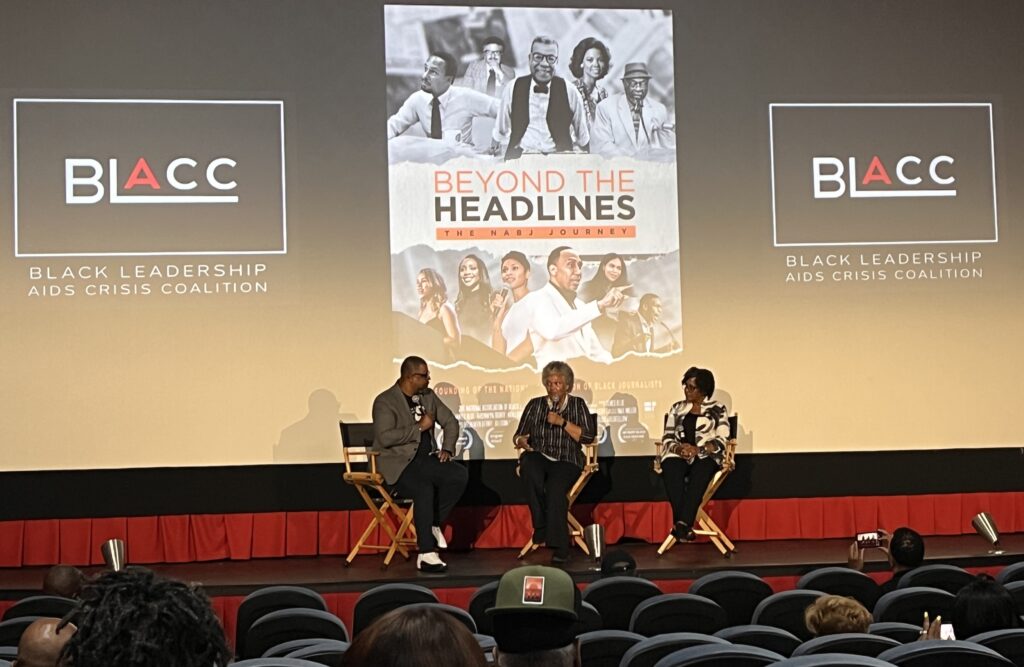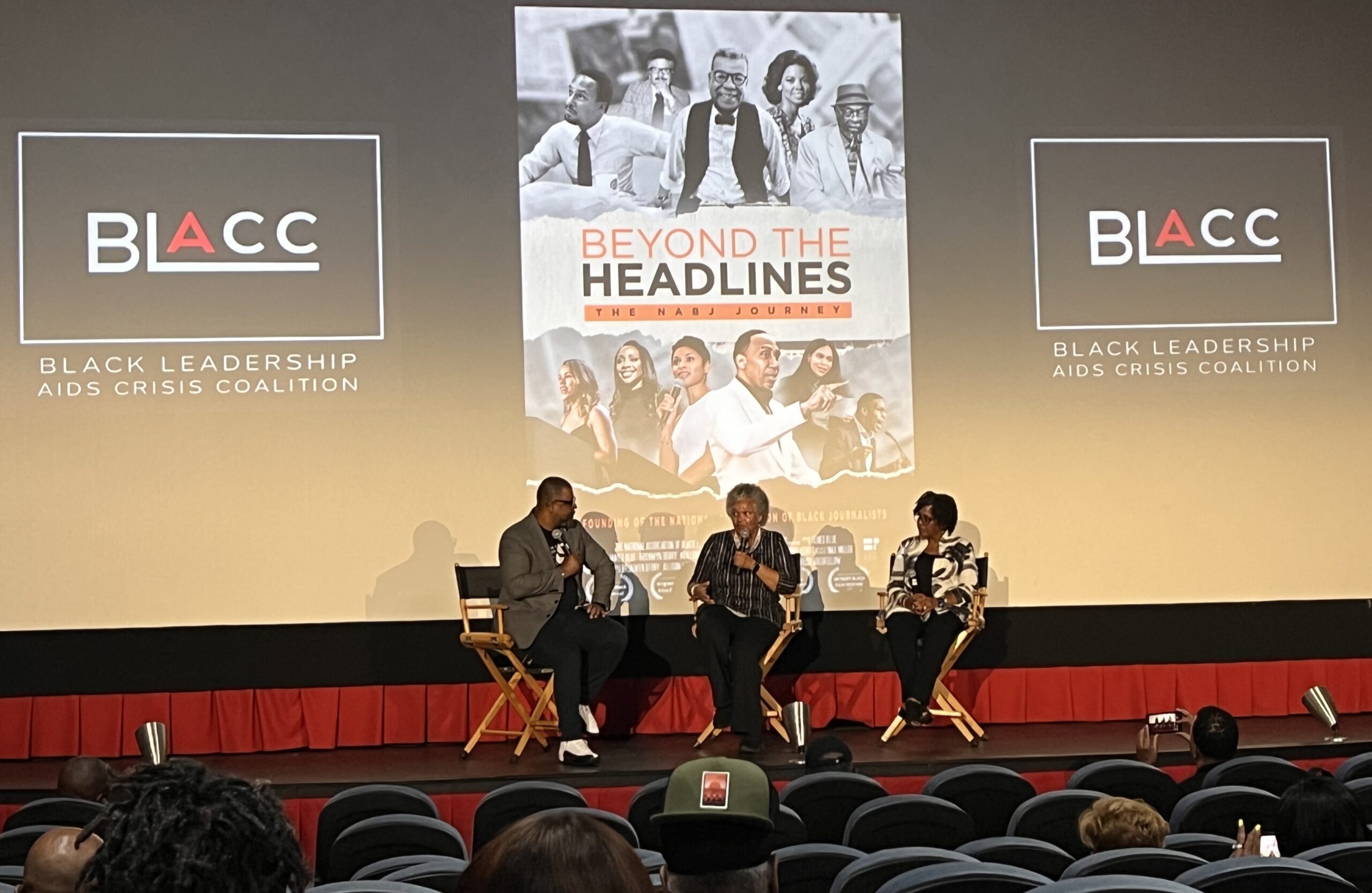ATLANTA — As journalism and journalists face attacks around the world from government censorship, disinformation, legal harassment, and physical harm, a national organization is being recognized for advocating for responsible journalism for more than 50 years.
The newly released film “Beyond the Headlines: The NABJ Journey” documents the history of the National Association of Black Journalists (NABJ), a nonprofit based in Maryland that supports Black journalists by offering professional development and career advancement opportunities, and advocating for fair journalism.
“In 1975, 44 mighty, bold founders came together with this vision to speak truth to power, and to make sure that we were not going to be silenced, that our voices were not going to be erased,” Errin Haines, NABJ president, said at a recent screening of the documentary in Atlanta.
“That is a message that is a mission 50 years later that matters more than ever,” added Haines, who is the editor-at-large for The 19th News.
Haines made the comments at the BronzeLens Film Festival last month.
The documentary recounts the organization’s development through the Ronald Reagan era, the crossing into the new millennium, the rise of Diversity, Equity, and Inclusion (DEI), and, now, the attack against it, and the group’s ongoing influence on American media.
The documentary sends a message that “the power of Black journalism matters, that our journalists matter, that representation in journalism is part of what it means to have a free press and a healthy, and truly representative democracy,” Haines said.

The film has been featured at several film festivals, including BronzeLens, the Orlando Urban Film Festival, the Sidewalk Film Festival in Birmingham, Alabama, and the XL Fest in Chicago.
Kathleen Bertrand, executive producer of the BronzeLens festival, said that it serves as a platform for content creators of color, helping to bring attention to them around the world. Journalism is under attack, she said.
“Our stories are under attack, our very history is under attack, and the work that the NABJ does is more important now than ever,” Bertrand said.
She continued to say that because of this era of misinformation and artificial intelligence saturating the quality of reporting, she is thrilled to have a part in showcasing to the world what the NABJ does and is pleased that the organization has decided to participate in this year’s festivities.
Sherida Byrd has been attending the festival for over 16 years. She told Black News & Views that she usually watches the short film entries and does not watch the documentary entries, but was glad she took the time to watch this one.
The same applies to writer Toi Jamel, who had no idea that NABJ played a significant role in American journalism over the past few decades and added to the industry’s importance in general.
“My favorite part was probably the impact of students – the relationships with young people – and embracing them and bringing them up in the industry,” Jamel said. “And they come back and pour more into the people behind them. That’s incredible.”
The film mentioned that several well-known journalists, like NBC News correspondent Shaquille Brewster and “#RolandMartinUnfiltered” host Roland Martin, gained their start in media with NABJ’s Student Projects, which had professionals teach college students how to create a newscast, newspaper, or digital news magazine during the conference each year.
Jay-Paul Kirk, a Black man, said that when he thinks of Black journalists, he thinks of those who can tell the story from his perspective. He gave the film five out of five stars, the festival’s highest rating.
“As Black journalists continue to evolve, as media continues to evolve, how do Black journalists continue to be relevant and are coming out that show different ways of giving Black voices and opportunity,” Kirk said.
Two of the organization’s founders, Allison Davis and Sandra Long Weaver, spoke to Leroy Chapman, editor-in-chief of the Atlanta Journal-Constitution and the organization’s first Black American in that role, during a panel discussion focused on why it was essential to create an organization like NABJ
They emphasized the importance of mentorship, training, and advocating for diverse roles in journalism. The discussion also touched on the challenges of maintaining black history and the need for continued support for young journalists.
“I was 23 working in Wilmington, Delaware, and I was the only Black person, Black woman, in the newsroom,” said Long Weaver, who is president of Dawson Media Group.
“(I did not know) that I would become a founder of that organization, but (I wanted) to be a part of an organization where I could talk to other Black journalists and learn how they navigated getting better stories, how they talked to their boss — little questions that young journalists today still may ask, but I didn’t have anybody that looked like me, that I could ask that question,” she said.
This year, the founders were celebrated during NABJ’s annual conference, held this year in Cleveland.
Davis said she was 22 years old when other founders asked her to write the organization’s first constitution.
She said that she still gets a kick out of convention goers calling her “founder” to this day.
“My husband went to one conference with me. I’m walking around with him, and someone goes ‘hello founder,’ ‘hello founder,’ ” said Davis, who is also the founder of Coopty Productions in New Jersey. “And now he calls me ‘flounder’ ” as a joke, she said.
Kirk said he enjoyed learning about the organization’s history through the film, particularly about the organization’s foundation.
.“People kind of unknowingly walk into history and are impactful,” Kirk said. “I think it just showed how we as Black people continue to find ways to come together, be able to support each other throughout our history.”
Richard Prince, the author of a column focused on issues involving journalists of color and related topics, has criticized the documentary for giving the impression that no more than three or four Black journalists existed at any newspaper 50 years ago, when NABJ was founded. Prince maintains this is not true, and that there were more Black journalists at the Washington Post, where he was on staff. Haines is quoted in Prince’s column, “Journal-isms,” as saying, “I consider the documentary a good start that is not meant to be a definitive history of NABJ or Black journalism. It is an important part of what I hope will be ongoing storytelling about Black journalists’ contribution to our profession and our democracy.”
On Sept. 22, the Greater Cleveland Urban Film Festival will stream the documentary online through Eventive. Pre-ordering is now available on the platform.
“Beyond the Headlines: The NABJ Journey” will be featured at other film festivals in New York, Chicago, Oakland, and Birmingham, Alabama.






